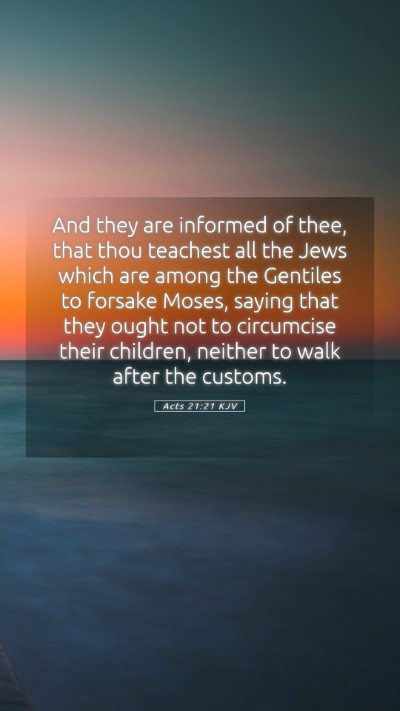Understanding Acts 21:21: An In-Depth Bible Verse Commentary
Acts 21:21 states, "And they are informed of you, that you teach all the Jews which are among the Gentiles to forsake Moses, saying that they ought not to circumcise their children, neither to walk after the customs." This verse is key to understanding the tension between early Christianity and Jewish customs. Below is a detailed Bible verse explanation based on public domain commentaries.
Overview of Acts 21:21
This verse highlights the accusations against Paul, indicating his teachings were perceived as undermining traditional Jewish practices. This crucial moment reflects a broader narrative in Acts regarding the transition from Jewish law to the gospel of grace.
Historical Context
To comprehend the significance of Acts 21:21, it is essential to analyze the historical backdrop:
- The early Church was composed primarily of Jewish believers who were accustomed to the Law of Moses.
- As the gospel spread among Gentiles, tensions arose regarding adherence to Jewish customs, including circumcision.
- Paul's mission to the Gentiles led to concerns among Jewish Christians that he was disregarding Jewish traditions.
Bible Verse Meanings and Interpretations
According to Matthew Henry, this verse demonstrates how the gospel was initially received by those who followed Jewish customs, yet faced conflict as it expanded into Gentile territories. He emphasizes the struggle between maintaining cultural identity and embracing the new covenant through Christ.
Albert Barnes notes that the accusation against Paul signifies a critical moment where misunderstandings about the Christian doctrine were pervasive. Barnes highlights that the early Church had to navigate complex issues involving law and grace, showcasing the need for clarity in teachings.
Adam Clarke provides additional insight on how this situation exemplifies the growing divide between Jews and Gentiles within the Church. Clarke emphasizes that the early Christians had not yet fully understood the implications of Christ’s fulfillment of the Law in the New Covenant.
Key Themes in Acts 21:21
- Conflict between Old and New Testament teachings: The verse illustrates the friction between Old Testament practices and the emerging understanding of grace.
- Miscommunication and Misunderstanding: Paul's challenges indicate how the gospel was often misrepresented, leading to conflict.
- Identity of Believers: The verse explores the evolving identity of believers transitioning from Jewish customs into a broader Christian faith.
Application of Acts 21:21
Understanding Acts 21:21 in our modern context invites us to reflect on:
- How we understand and communicate our faith within diverse cultural backgrounds.
- The importance of putting the message of the gospel at the forefront, rather than cultural practices.
- The necessity for Christian unity that transcends traditional boundaries.
Cross References
Acts 21:21 is related to several other scripture passages, including:
- Galatians 2:4-5: Discusses the pressure from false brethren to adhere to Jewish laws.
- Acts 15:1-2: The Jerusalem Council's decision about the necessity of circumcision for Gentile believers.
- Romans 7:6: Paul's teaching about being released from the law and serving in the new way of the Spirit.
Conclusion
Acts 21:21 serves as a lens into the early Church's struggles and transitions. By understanding the implications of this verse, we gain valuable insights into the broader themes of grace, identity, and the nature of Christian teaching. Such analysis is vital for anyone engaged in Bible study, scripture analysis, and the interpretation of complex biblical passages.


